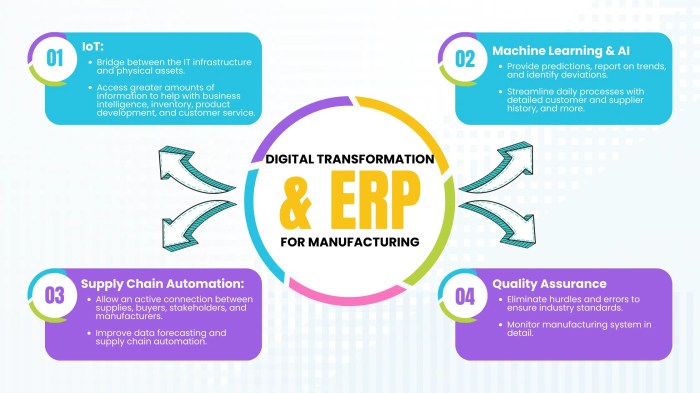How ERP can help businesses adapt to changing market conditions sets the stage for this enthralling narrative, offering readers a glimpse into a story that is rich in detail and brimming with originality from the outset. In today’s dynamic business landscape, staying ahead of the curve is paramount. Market conditions are constantly evolving, driven by shifting customer preferences, technological advancements, and economic fluctuations.
Businesses need to be agile and responsive to these changes to remain competitive.
Enter Enterprise Resource Planning (ERP) systems, powerful tools that can provide businesses with the insights and capabilities necessary to navigate this volatile environment. ERP systems offer real-time data and analytics, allowing businesses to understand customer behavior, track sales trends, and identify emerging opportunities. This information empowers organizations to make informed decisions, adjust their operations, and optimize their product offerings to meet evolving market demands.
Case Studies

The power of ERP in driving adaptability is best illustrated through real-world examples. These case studies showcase how businesses across different industries have successfully leveraged ERP systems to navigate changing market conditions, overcome challenges, and achieve tangible benefits.
ERP Enables Agile Manufacturing in a Changing Market
This case study explores how a leading manufacturer of consumer electronics, facing increasing competition and fluctuating demand, implemented an ERP system to enhance agility and responsiveness.The company previously relied on a patchwork of disparate systems, leading to inefficient processes, poor visibility, and difficulty in adapting to changing market conditions. The implementation of an integrated ERP system addressed these challenges by:
- Centralized Data Management: The ERP system consolidated data from various departments, providing a single source of truth for critical business information. This enabled real-time insights into inventory levels, production schedules, and customer orders, allowing for more informed decision-making.
- Streamlined Processes: The ERP system automated key processes, such as order management, production planning, and inventory control. This reduced manual effort, minimized errors, and accelerated the overall production cycle.
- Enhanced Supply Chain Visibility: The ERP system provided visibility into the entire supply chain, from raw materials procurement to finished goods delivery. This allowed the company to proactively identify potential disruptions and adjust production plans accordingly.
The implementation of the ERP system resulted in several tangible benefits:
- Reduced Lead Times: The streamlined processes and improved visibility enabled the company to reduce lead times by 20%, allowing for faster response to customer demands.
- Increased Production Efficiency: The ERP system optimized production schedules and resource allocation, leading to a 15% increase in production efficiency.
- Improved Inventory Management: The ERP system reduced inventory carrying costs by 10% through better demand forecasting and optimized inventory levels.
- Enhanced Customer Satisfaction: The ability to respond to customer demands more quickly and efficiently resulted in a 5% increase in customer satisfaction.
Choosing the Right ERP for Adaptability: How ERP Can Help Businesses Adapt To Changing Market Conditions

Selecting the right ERP system is crucial for businesses looking to adapt to changing market conditions. The wrong ERP can hinder agility and responsiveness, while the right one can be a powerful tool for navigating dynamic environments.
Factors to Consider When Choosing an ERP System
When choosing an ERP system, it’s essential to consider several factors that directly impact adaptability. These factors help businesses evaluate the system’s ability to support evolving business needs and ensure a smooth transition to a more agile and responsive operation.
- Scalability: A scalable ERP system can grow with your business, accommodating increasing data volumes, user numbers, and transaction complexity. This ensures the system remains efficient and effective as your business expands.
- Flexibility: A flexible ERP system allows businesses to customize workflows, processes, and reporting to match their unique requirements. This adaptability is crucial for responding to changing market demands and implementing new strategies.
- Integration Capabilities: Seamless integration with existing systems and applications is vital for data consistency and efficient workflows. An ERP system with strong integration capabilities facilitates data sharing, reduces redundancies, and streamlines operations, contributing to agility.
Evaluating ERP Solutions for Adaptability, How ERP can help businesses adapt to changing market conditions
Businesses should evaluate ERP solutions based on their ability to support agility and responsiveness. This assessment involves examining various aspects of the system and its features to determine its suitability for dynamic business environments.
- Cloud-Based Solutions: Cloud-based ERPs offer inherent flexibility and scalability, allowing businesses to adapt quickly to changing demands. They provide access to real-time data, enabling faster decision-making and improved responsiveness.
- Mobile Accessibility: Mobile access to ERP systems empowers employees to work remotely and access critical information anytime, anywhere. This accessibility enhances agility by enabling real-time collaboration and decision-making, even outside traditional office settings.
- Real-Time Analytics: ERPs with robust analytics capabilities provide insights into business performance and market trends, enabling informed decision-making. Real-time data analysis empowers businesses to adapt quickly to changing market conditions and seize new opportunities.
Choosing an ERP Provider for Ongoing Support and Updates
The choice of ERP provider is just as important as the ERP system itself. A reliable provider offers ongoing support and updates to ensure continued adaptability and ensure the system remains relevant and effective over time.
“Selecting an ERP provider is a long-term commitment. Ensure they offer regular updates, ongoing support, and a commitment to innovation to ensure your system remains adaptable and meets evolving business needs.”
In conclusion, ERP systems are not just software solutions; they are strategic tools that empower businesses to adapt to changing market conditions. By providing real-time insights, streamlining processes, and facilitating collaboration, ERP helps organizations stay ahead of the curve, seize new opportunities, and thrive in a dynamic business world. Investing in the right ERP solution is a strategic decision that can make a significant difference in a business’s ability to adapt, innovate, and achieve sustainable success.
FAQ Insights
What are some examples of how ERP can help businesses adapt to changing customer preferences?
ERP systems can help businesses track customer preferences and buying habits through integrated CRM modules. This data allows companies to personalize marketing campaigns, develop targeted product offerings, and provide better customer service, ultimately leading to increased customer satisfaction and loyalty.
How can ERP help businesses respond to economic fluctuations?
ERP systems provide financial management tools that enable businesses to track expenses, manage cash flow, and forecast financial performance. This information helps organizations make informed decisions about pricing, resource allocation, and cost optimization, allowing them to adapt to economic changes and maintain profitability.
What are some key factors to consider when choosing an ERP system for adaptability?
When selecting an ERP system, businesses should consider factors such as scalability, flexibility, integration capabilities, and the provider’s commitment to ongoing support and updates. These factors ensure that the chosen ERP solution can grow with the business and adapt to future market changes.